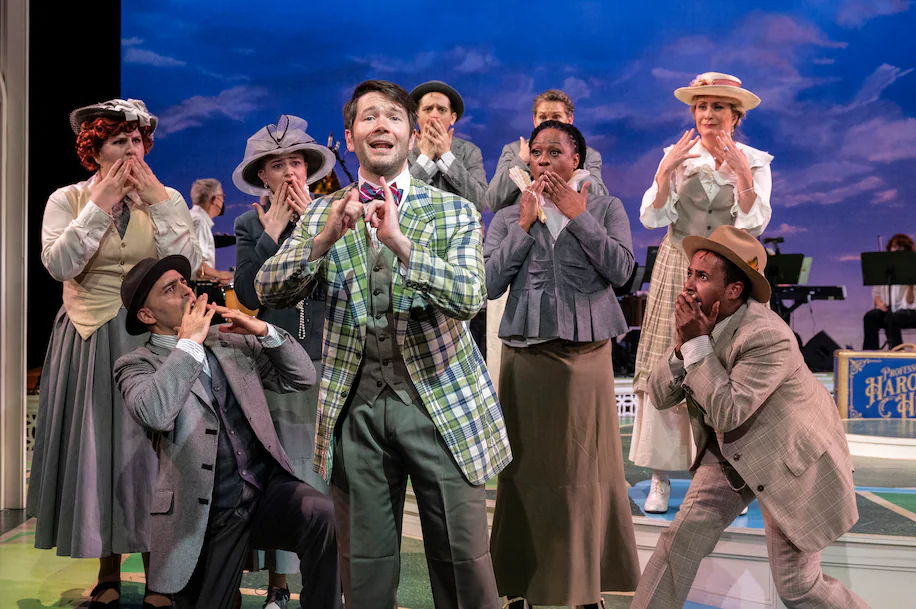Entering the July 4th weekend, my wife and I were looking to have an evening out and see a live stage show.
Our choice was Meredith Wilson’s The Music Man. Opening night had been delayed by several days because of Covid within the crew; tickets were easy to find on the Friday before the holiday.
We looked forward to the familiar story of Professor Harold Hill trying to con an Iowa town into believing he could create a boy’s band with uniforms and then skip out with the cash.
The musical’s songs are now familiar to all generations including Seventy-Six Trombones, Ya Got Trouble, Marian the Librarian, The Wells Frago Wagon, plus two barbershop quartets of men and women singing Lida Rose and Goodnight Ladies.
As one reviewer stated about the production on opening night: Professor Hill is a high-octane opportunist with a jaunty strut and an eye for all exploitable human weakness, Caverly’s Hill is so raffishly charming it’s no wonder River City falls for his racket — except for the librarian Marian Paroo .
Hill sells his con in the opening number: Watch his delectable sneer when he compares pool to horse racing (that devil’s sport!). Spot how he deftly weaves the evocation of a pool cue’s motion into his spiel. Relish the assessing glance he sneaks at his enthralled dupes. Hill is effective because he’s a brilliantly calculating showman — but also because he revels in his own hoax.
The Impossible Surprise
We did not know, until scanning a review, that this production would be by a cast of deaf and hearing actors. Professor Hill signed all of his songs while his companion, Hill’s old friend Marcellus Washburn, sings most of Hill’s songs, including the exuberant “Seventy-Six Trombones.”
Half of each barbershop quartet is hearing. All use American sign language with two parts backed up by singers at the side of the stage.
All of the “dialogue” whether spoken or signed is projected on screens along the top and back of the stage.
The theatrical experience was extraordinary. American Sign Language is communication with hands, arms and face. All of the deaf actors performed their lines with the same expressions and physical movements as if they were speaking.
It was not the static signed interpretation one might see in newscast alongside the main speaker. These people were performing their characters integrated fully into the play’s action.
For me one of the memorable moments was the opening dance number of the second act Shipoppi. Harold dances with Marion, and actress who both signs and sings. How did he keep the dance rhythm? Harold didn’t miss a beat, even without hearing!
A Takeaway
When we had read that the production would include both deaf and hearing actors, we were skeptical.
But the experience was magical. The story and songs are the same presentation of a salesman’s flimflam hustle testing an Iowa town’s hard earned down-to-earth integrity.
To see deaf actors in leading roles and singing actors signing gave the production an exuberance that seemed deeply genuine not merely theatrical.
(photo by Teresa Castracane)
It is ironic that the show’s lead role, the huckster Harold Hill, had to overcome his character’s own moral failures while navigating his real human deafness in playing the part. In doing so, he gave the role a double meaning it would normally lack.
I could not help but think of a parallel to some of the experiences credit union people convey. Yes, they believe in what they do and want their institution to do well.
But the really great ones do more by showing that the meaning underscoring each relationship is that everybody does matter. Harold Hill’s character played by a deaf actor became about much more than a play.
Or as one character states: “I couldn’t make myself any plainer if I’see a Quaker on his day off.”

